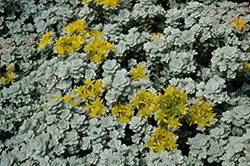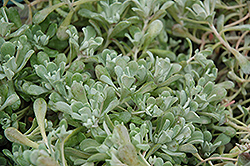It's all about ...
plants

Cape Blanco Stonecrop
Sedum spathulifolium 'Cape Blanco'
Plant Height: 4 inches
Flower Height: 6 inches
Spacing: 10 inches
Sunlight:
![]()
![]()
Hardiness Zone: 5a
Other Names: Spoon-leaved Stonecrop, Gormania spathulifolia
Description:
This well-behaved stonecrop species is an excellent edging or rock garden plant particularly for hot dry sites; a low, slow spreading cushion or carpet of powdery gray-green leaves; bright golden yellow flowers make a lovely late summer display
Ornamental Features
Cape Blanco Stonecrop is bathed in stunning gold star-shaped flowers with yellow overtones at the ends of the stems from mid to late summer. Its attractive tiny succulent round leaves emerge silvery blue in spring, turning grayish green in colour the rest of the year.
Landscape Attributes
Cape Blanco Stonecrop is a dense herbaceous evergreen perennial with an upright spreading habit of growth. It brings an extremely fine and delicate texture to the garden composition and should be used to full effect.
This plant will require occasional maintenance and upkeep, and is best cleaned up in early spring before it resumes active growth for the season. Deer don't particularly care for this plant and will usually leave it alone in favor of tastier treats. It has no significant negative characteristics.
Cape Blanco Stonecrop is recommended for the following landscape applications;
- Mass Planting
- Rock/Alpine Gardens
- Border Edging
- General Garden Use
- Groundcover
Planting & Growing
Cape Blanco Stonecrop will grow to be only 4 inches tall at maturity extending to 6 inches tall with the flowers, with a spread of 12 inches. When grown in masses or used as a bedding plant, individual plants should be spaced approximately 10 inches apart. Its foliage tends to remain low and dense right to the ground. It grows at a medium rate, and under ideal conditions can be expected to live for approximately 10 years. As an evegreen perennial, this plant will typically keep its form and foliage year-round.
This plant does best in full sun to partial shade. It prefers dry to average moisture levels with very well-drained soil, and will often die in standing water. It is considered to be drought-tolerant, and thus makes an ideal choice for a low-water garden or xeriscape application. It is not particular as to soil pH, but grows best in poor soils, and is able to handle environmental salt. It is highly tolerant of urban pollution and will even thrive in inner city environments. This is a selected variety of a species not originally from North America. It can be propagated by division; however, as a cultivated variety, be aware that it may be subject to certain restrictions or prohibitions on propagation.
This plant is not reliably hardy in our region, and certain restrictions may apply; contact the store for more information.

